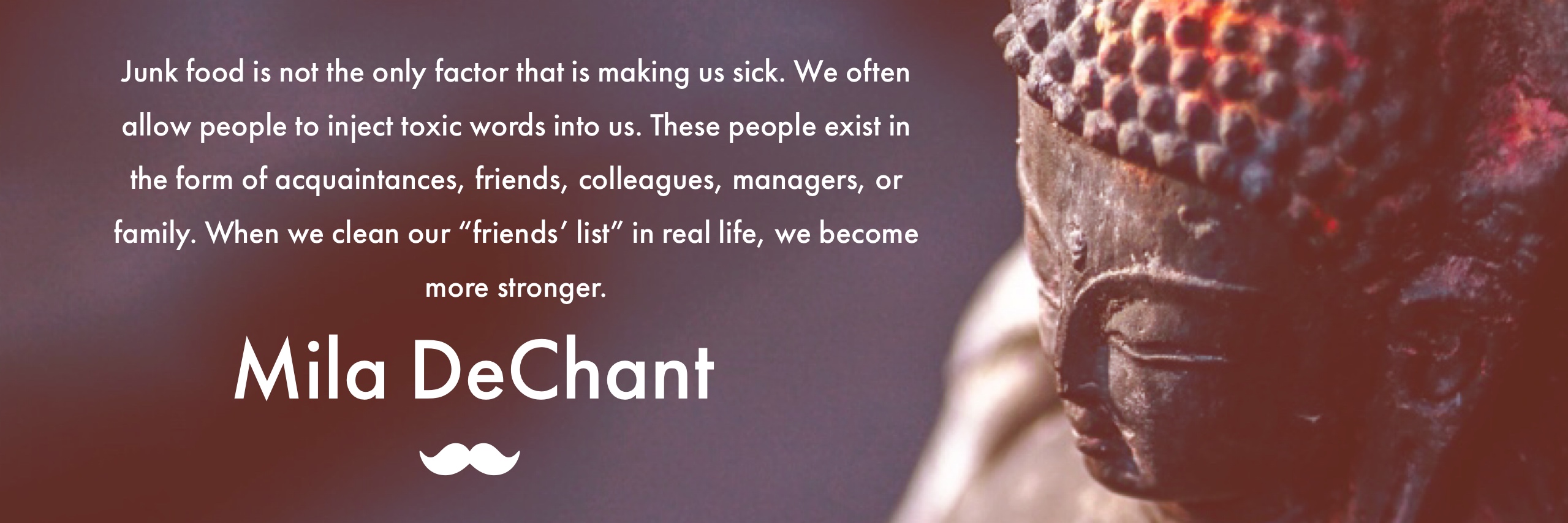Exercising, eating right, getting 8 hours of sleep, and meditation are not the only habits to becoming healthy. The company we keep is the key factor to our central health – mental health. This company can be our acquaintances, friends, colleagues, managers, family, or online “friends”.
We are often hesitant to put people in their places or speak up for ourselves when the company we keep provides us with unsolicited words of advise or a singular perspective of feedback if its from colleagues or managers. We somehow feel obligated to listen to these so called “words of wisdom” or so called “feedback to improve your career” when it is actually affecting us in a negative manner. Let me break this down into three parts.
- Part 1 will encompass of acquaintances and online “friends”
- Part 2 will encompass of colleagues and managers
- Part 3 will encompass of family and friends
Part 1: Acquaintances and Online “Friends”
We are constantly attempting to build our credibility but we start with the wrong group of people. We worry about what our followers or acquaintances perceive of us. Hence, resulting in us allowing their perception to mould us. We are afraid of losing followers or have this obsession of maintaining an image where people respect us. What we are forgetting is that in order to build self respect, we have to become confident of whom we are without supporters. We must eliminate the urge to be validated constantly by those who are not bringing value to us in our personal lives, social lives, or professional lives. The constant urge to want to upkeep your “image” based on what the internet or 3rd degree connections expects us to be puts us in a depressive state playing tug of war with with true self and with a facade we have created.
Part 2: Colleagues and Managers
We often put up with unacceptable behaviours of colleagues or managers when they minimize our input, ideas, work or existence. Some of us do not wish to rock the boat too much because of what our managers might write in our performance reviews or what our colleagues might say to our managers or even with the fear of losing the job. We have to acknowledge the white elephant in the room. Most of the time most managers or leadership gravitate towards people who are “yes men or women”. When we stand out in a unique manner where we disagree with their ways or challenge their ways, they use their power to sabotage our careers. This happens widely but is often unspoken of due to protecting a company’s image. So what do we often do when our colleagues or managers treat us differently when we disagree with their ways? We put up with the toxic treatment and words. This causes mental and emotional stress that can result in our overall being as a person and our performance. This needs to stop – from both sides.
Part 3: Family and Friends
This is the most sensitive and closest relationship we inherit in our lives. But at the same time, closeness should never be used as a reason to allow words of doubt or words of fear to be spewed onto us. We easily give a pass to our family members and close friends a pass accepting the fact that they know the best for us. Hence, we allow their behaviour towards our goals to be diminished. Yes, often times their concerns come from a place of love and genuine care but at the same time it comes from a place of their own insecurities. Our goals or our aspirations are looked as precarious and a huge risk from the eyes of those who have never taken a risk and this can come from our own family or close friends. We often make decisions to please our family or close friends and in the end we end up with remorse. We then reflect and direct that remorse 10 years later or 20 years later.
How Do We Then Approach The Company We Keep?
Believe in Your Capabilities and Stand Up for Yourself
- If the situation is with our acquaintances and online “friends”, we can always take a firm stance. Think about how Jameela Jamil put her haters or nay sayers at bay. We have to believe in our own capabilities and especially tell the unknown trolls to back off.
- If the situation is with your colleagues or managers, we definitely have the right to our voice, have the right to nip this form of passive – aggressive bullying in the bud. How do we do this?
- Knowing our worth is the first step to owning our identity in the workplace. Once we know our own worth, we become more confident in approaching mistreatment.
- Have a firm conversation with managers or colleagues about how their behaviour is unacceptable and why it is unacceptable. Find a solution as this falls under how we resolve conflict upon analysing it.
- If the behaviour continues from our colleagues or managers, then this becomes a systemic issue. Engage the HR partner and then go above the chain of command if nothing seems to be resolved within the lower chains of command. This then becomes a learning and strategy opportunity for us and HR partners within an organization – An opportunity to propose and implement how human capital must be cultivated.
- If the situation is with family and close friends, we sometimes need to have a honest conversation with them. Only we will know what we want in our lives and how we want to live. Having an open and honest conversation about how their words and actions are affecting us is a good start. We do not need to them to agree with our goals and dreams but we need them to understand where we are coming from and communicate the kind of support we need from them. We are not meant to agree with our family and friends all the time. That does not reflect a balanced and healthy relationship.
MILA’S TAKE: Sometimes, having a conversation with HR partners does not help with the passive-aggressive behaviours of managers or colleagues. We sometimes need to take on extreme action in order to see change. I personally have called on the ethics line to speak with someone to report the unethical behaviours because I saw unethical behaviour from a plane where management was planning to fire someone because one particular manager just did not like the personality of someone. They framed it in such a way where they found ways to nitpick on my colleague’s performance and work. I felt it was my social responsibility to speak up for those who were affected. I knew I was going down because I started seeing patterns of being ostracized myself, but I wanted to ensure I spoke with someone where change was brought. I wanted to be the voice that many people had lost.


